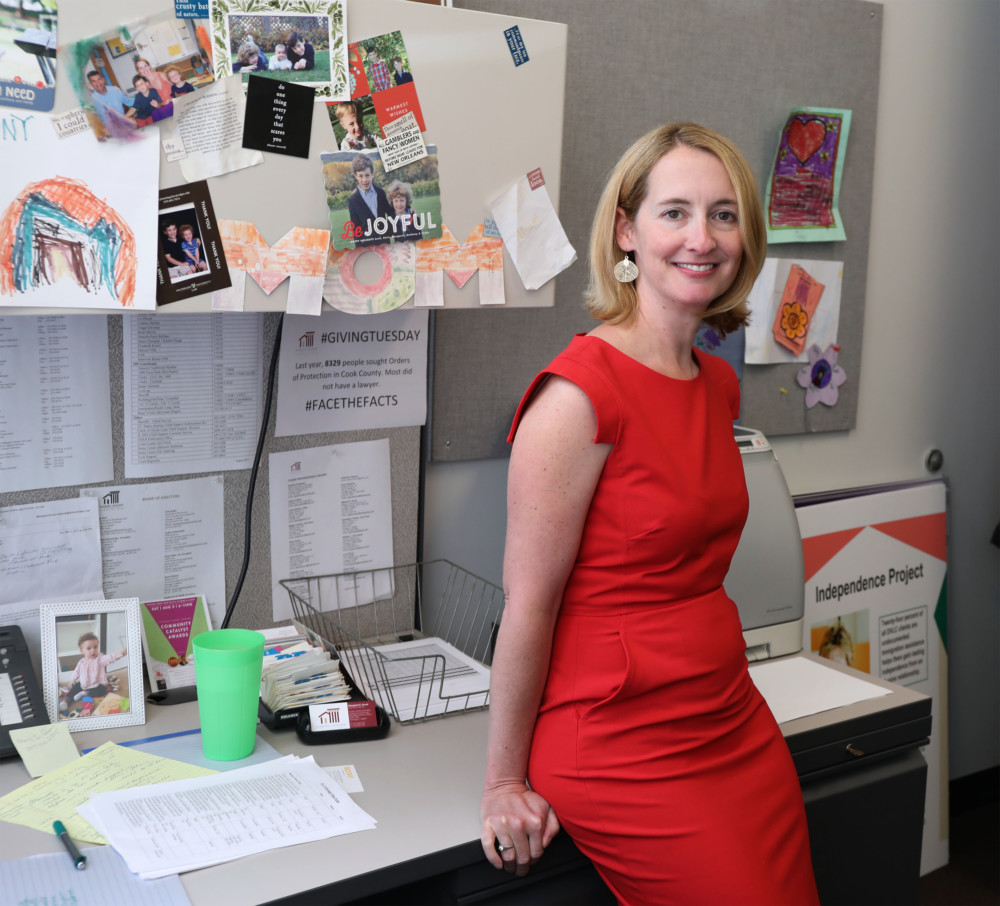By Heidi Stevens
Chicago Tribune
WWR Article Summary (tl;dr) Great article on Margaret Duval, the executive director of the Domestic Violence Legal Clinic, a small group of attorneys housed in the courthouse of Chicago’s centralized domestic violence court.
Chicago Tribune
When I feel discouraged about Chicago and its toll on the human spirit, on human life, all too often, I look around for the people making a difference.
It’s a variation, I suppose, on that wonderful Mr. Rogers quote. “When I was a boy and I would see scary things in the news,” he said, “my mother would say to me, ‘Look for the helpers. You will always find people who are helping.'”
Margaret Duval is one. She’s the executive director of the Domestic Violence Legal Clinic, a small group of attorneys housed in the courthouse at 555 W. Harrison St., the site of Chicago’s centralized domestic violence court.
Duval and her staff provide free, same-day legal services to families in the midst of a crisis or its immediate aftermath.
I met Duval when Illinois was experiencing its own crisis, yet another year without a state budget, and I was looking around for social service providers who needed to get creative to keep the lights on.
The clinic hadn’t received any state funding since August 2016, and Duval and her staff were relying heavily on private donors to fill the gaping hole where about $249,000 should be. A grant paid for by the Victims of Crime Act helped, that’s federal legislation passed in 1984 that set up a fund to compensate crime victims. But that didn’t cover general operating expenses.
Shortly after Duval and I met, the state passed a budget.
“I’m really grateful to all of the people who have spoken up and advocated for compromise,” Duval told me. “And I’m relieved that Illinoisans did not accept dysfunction as the new normal.”
The clinic’s work is vital. About 7,000 people filed for civil orders of protection at the courthouse last year, Duval said.
“We’re typically able to assist 1,000 of them,” she said.
buy elavil generic buy elavil online no prescription
“A lot of people are not getting the help they need.”
After winding their way through lines and security (no cellphones, no cellphone chargers), women, mostly, arrive in Duval’s office in search of guidance.
“We meet people where they are and identify all the things that are keeping them from being safe,” she said. “We’re helping them write the story detailing a history of abuse. We’re helping them file the paperwork and accompanying them to court. It’s a judicial process.”
The clinic also provides family law and immigration counsel, all pro bono.
Duval, 42, has been in Chicago since 2008 and running the clinic since 2012. Prior to that, she worked in Washington, D.C., and Richmond, Va., litigating divorce, custody, support and protective order cases for domestic violence survivors. She graduated from the University of Virginia’s law school.
I asked her what has changed during the years she’s borne witness to abuse.
Phones, she said. Abusers used to rip them out of the wall to keep their partners isolated and unable to seek help.
Now they steal or smash their cellphones.
What hasn’t changed, she said, is how incredibly complicated it can be to extricate yourself from an abusive relationship.
“We talk about getting people jobs and getting people economically independent,” she said. “But our clients here, they come to court and they don’t have enough money to get home. When you think about the challenges of physically moving from point A to point B, that makes it much harder to change where you’re going to live and with whom you’re going to live. If you’re rationing diapers for your baby, those are the types of instances that make people feel like they need to stay in a relationship.”
And emotional entanglements are no small knot to unravel.
“For all these relationships, there was something positive initially,” Duval said. “There was a time when the relationship was good, and there still may be times the relationship is good. For many people, the desire to fix the relationship or help the person or change your own behavior in an attempt to make the abuse stop, that’s big. That is something in the human experience that hasn’t changed, and I don’t anticipate it will.”
Duval has three children, ages 10, 7, and 2. I asked her if it’s hard not to feel haunted by the challenges of her work, not the work itself, but the degree of human suffering, and the human depravity it reveals.
“I focus on the successes that we get, and I focus on the sense of possibility and the difference we’re making,” she said. “There is a real danger of becoming jaded or burnt out or cynical.
“Cynicism is something I fight a lot,” she said. “When I recognize it in colleagues, I try to call it out before it becomes too late. There are ways you can cultivate a culture that continues to be professional but compassionate.”
Domestic violence is often considered someone else’s problem, someone else’s culture, someone else’s neighborhood, someone else’s family.
It’s not. It’s rooted in challenges and behaviors and, in some cases, addictions, that affect every population.
I’m inspired by Duval’s ability to look at such complicated relationships and see that they had, or may still have, genuine affection at the center, even as she advocates for their necessary demise.
It strikes me as a merciful, generous read on humanity, from a person surrounded by daily evidence of humanity’s shortcomings.
It’s a good example for all of us. Help where you can. Don’t surrender hope. And know that working to understand another person’s suffering may be the key to alleviating, rather than compounding, it.














































































































































































































































































































































































